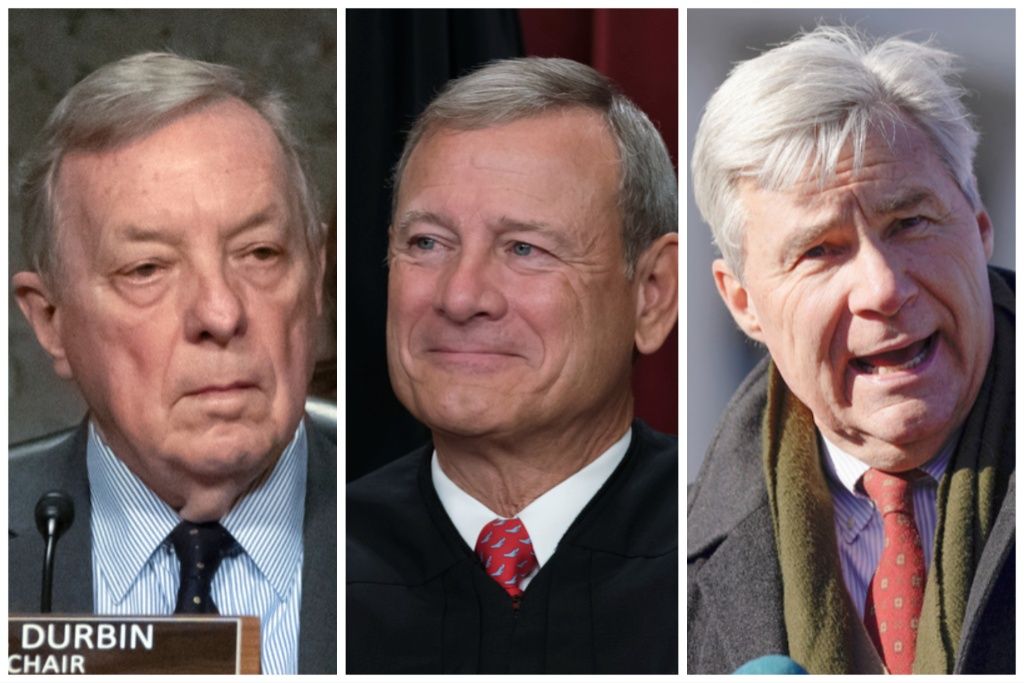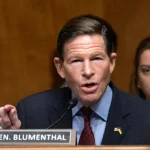
Senate Judiciary Committee Chairman Dick Durbin (D-IL) directly pressed Chief Justice John Roberts on the need for enforceable ethics reforms during the Supreme Court’s semiannual Judicial Conference on Tuesday.
Durbin, who has long advocated a binding ethics code for justices, expressed his concerns to Roberts during the twice-annual meeting of the Judicial Conference, the judiciary’s policymaking body chaired by Roberts. Durbin renewed his arguments that recently adopted ethics guidelines for the high court remain inadequate due to the absence of enforcement mechanisms, a source familiar with the event told the Washington Examiner.
Durbin’s push comes amid growing scrutiny of the justices following reports that some had accepted undisclosed gifts from donors. While the court introduced an ethics code last year, critics, including Durbin and Sen. Sheldon Whitehouse (D-RI), have continued to call for stronger oversight. Democratic-appointed Justices Elena Kagan and Ketanji Brown Jackson have indicated their openness to an enforceable code, with Kagan endorsing the idea in July and Jackson supporting it earlier this month.
Speaking to judiciary officials, Durbin acknowledged the adoption of the ethics code as a positive step but emphasized that it falls short of public expectations. He also urged the Judicial Conference to support legislation aimed at curbing judge shopping, the practice of filing cases in courts perceived more likely to offer favorable rulings, according to a report from Bloomberg.

In addition to Roberts, the meeting was attended by other key figures, including Attorney General Merrick Garland and several members of the Senate Judiciary Committee, such as Whitehouse and Sens. John Kennedy (R-LA) and Susan Collins (R-ME).
Judge Jeffrey Sutton, who leads the Judicial Conference’s executive committee, briefed reporters on the meeting’s focus, which included significant discussions on boosting the judiciary’s cybersecurity precautions. Sutton stressed that there was not a specific threat but raised general concerns from the intelligence community about the heightened risk of foreign cyberattacks during the 2024 election cycle.
Judge Michael Scudder of the U.S. Court of Appeals for the 7th Circuit highlighted the need for increased vigilance within the judiciary’s IT systems.
Durbin’s push for stronger Supreme Court ethics oversight comes as the Biden-Harris administration has chosen to embrace judiciary reform proposals that they say would be enacted if Democrats have full control of Congress and the executive branch following the election. It also comes after Roberts became the target of recent leaks out of the Supreme Court, which included internal memos that characterized him as strong-arming other members of the court to build consensus on legal cases involving former President Donald Trump.
For example, Harris’s campaign said in August that her views on judicial reforms were “aligned” with a bill introduced by Whitehouse that would create 18-year term limits for justices, as well as stricter ethics and recusal rules.
CLICK HERE TO READ MORE FROM THE WASHINGTON EXAMINER
Critics say these types of reforms could have a chilling effect on the judicial branch and disrupt the separation of powers. Republicans such as Sen. Lindsey Graham (R-SC) have suggested that similar ethics legislation for the justices is intended to “destroy a conservative court.”
For now, however, the question of whether Roberts and the judiciary will embrace binding reforms remains unclear.






